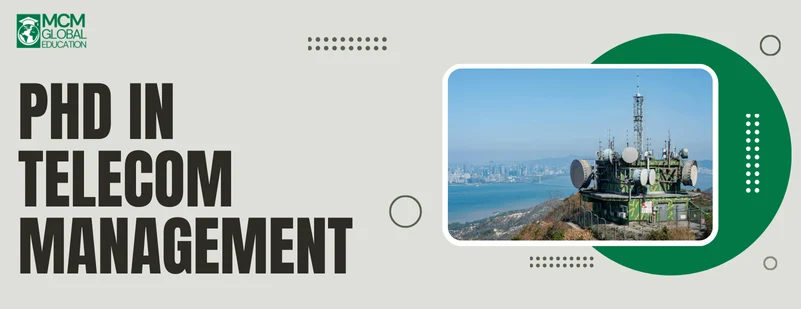The telecom industry is one of the most dynamic sectors in the world, powering global communication, digital transformation, and business innovation. With the rise of 5G networks, Internet of Things (IoT), artificial intelligence (AI), and cloud computing, the demand for advanced telecom leaders has never been greater.
For professionals and researchers seeking the highest academic and professional recognition, a PhD in Telecom Management is the ultimate credential. This doctoral program prepares candidates to lead telecom enterprises, conduct high-level research, and contribute to innovations that shape the global communications industry.
In this blog, we’ll provide a comprehensive guide to pursuing a PhD in Telecom Management, including eligibility, curriculum, specializations, top universities, career opportunities, salary prospects, and future scope.
Table of Contents
What is a PhD in Telecom Management?
A PhD in Telecom Management is a research-focused doctoral degree designed for individuals who wish to specialize in the strategic, technological, and managerial aspects of the telecommunications industry.
This degree emphasizes:
- Telecom business strategy and leadership.
- Network infrastructure management.
- Digital communication systems.
- Policy and regulatory frameworks.
- Research in emerging technologies (5G, 6G, IoT, cloud computing).
Graduates of this program often take on roles as telecom executives, academic researchers, policymakers, and technology consultants in global organizations.
Why Pursue a PhD in Telecom Management?
There are several compelling reasons to pursue this degree:
| Reason | Benefit |
|---|---|
| Leadership Roles | Prepare for top-level positions in telecom firms and tech companies. |
| Research Opportunities | Conduct groundbreaking research on 5G, AI, IoT, and digital transformation. |
| Academic Careers | Become a professor or researcher in telecom management and information systems. |
| Global Demand | Telecom is the backbone of digital economies, creating worldwide career opportunities. |
| Policy Influence | Shape telecom regulations and digital infrastructure policies. |
Eligibility Criteria for PhD in Telecom Management
Although requirements vary across institutions, general criteria include:
Educational Qualification
- Master’s degree in telecom management, telecommunications, IT, electronics, business administration, or related fields.
- Minimum 55–60% aggregate marks or equivalent GPA.
Entrance Exams
- GRE/GMAT for U.S. universities.
- GATE/UGC-NET for Indian universities.
- TOEFL/IELTS for non-native English speakers (for global universities).
Additional Requirements
- Research proposal focused on telecom management or emerging communication technologies.
- Letters of recommendation and statement of purpose (SOP).
- Work or research experience in telecom, IT, or business strategy (preferred).
Duration of PhD in Telecom Management
| Study Mode | Duration |
|---|---|
| Full-Time | 3–5 years |
| Part-Time | 5–7 years |
| Online/Hybrid (rare) | 3–5 years |
Curriculum of PhD in Telecom Management
The curriculum blends business management, telecom systems, and advanced research methodologies.
Core Coursework
- Advanced Telecom Networks & Systems
- Strategic Telecom Management
- Telecom Business Models & Innovation
- Information & Communication Technology (ICT) Policy
- Research Methods & Data Analysis
- Regulatory Frameworks in Telecommunications
- Project Management in Telecom
- Research Focus Areas
- 5G and Beyond (6G) technologies
- Internet of Things (IoT) management
- Artificial Intelligence in telecom systems
- Cloud and edge computing in communications
- Cybersecurity in telecom networks
- Telecom policy and regulations
Year-Wise Structure
| Year | Focus Area |
|---|---|
| Year 1 | Coursework in telecom systems, strategy, and research methodology |
| Year 2 | Comprehensive exams + electives in specialized areas |
| Year 3 | Research proposal development + field studies |
| Year 4–5 | Dissertation writing, defense, and publications |
Specializations in PhD in Telecom Management
Students can tailor their doctoral research to specific areas of interest:
| Specialization | Focus Area |
|---|---|
| Telecom Business Strategy | Leadership, mergers, acquisitions, business models |
| Telecom Technology & Networks | 5G, 6G, IoT, fiber optics, satellite communication |
| Regulatory Affairs & Policy | Government regulations, spectrum allocation, international policy |
| Digital Transformation in Telecom | AI, big data, and cloud computing in telecom operations |
| Cybersecurity in Telecom | Securing telecom infrastructure and preventing cyberattacks |
| Smart Cities & Telecom | Urban planning, IoT integration, sustainable communication |
Top Universities Offering PhD in Telecom Management
Here are some leading institutions where you can pursue a PhD in Telecom Management or related areas:
| University | Country | Program |
|---|---|---|
| Arizona State University | USA | PhD in Electrical Engineering with Telecom specialization |
| University of Texas at Dallas | USA | PhD in Telecom & Information Systems |
| Telecom Paris (Institut Polytechnique de Paris) | France | PhD in Telecommunications & Management |
| Indian Institute of Technology (IIT Delhi, IIT Bombay) | India | PhD in Telecom Systems & Management |
| University of Melbourne | Australia | PhD in Telecommunications & Business Strategy |
| Technical University of Munich | Germany | PhD in Communication Networks |
| National University of Singapore | Singapore | PhD in Communications & New Media |
Career Opportunities After PhD in Telecom Management
Graduates of a PhD in Telecom Management are equipped for careers in academia, corporate leadership, policy-making, and consulting.
Academic Roles
- Professor in Telecom Management / Business Administration.
- Researcher in telecom systems and communication technology.
- Author of academic publications in telecom journals.
Corporate Roles
- Telecom Strategy Consultant.
- Chief Technology Officer (CTO) or Chief Information Officer (CIO).
- Director of Telecom Operations.
- Innovation Manager in telecom enterprises.
Policy & Government Roles
- Telecom Regulatory Analyst.
- Advisor in spectrum management and digital policy.
- Consultant to government telecom departments.
International Careers
- Work with organizations like ITU (International Telecommunication Union), World Bank, or OECD on global telecom projects.
Salary After PhD in Telecom Management
Salary varies depending on career path and region:
| Career Path | Average Salary (Annual) |
|---|---|
| University Professor | $80,000 – $130,000 |
| Telecom Strategy Consultant | $100,000 – $160,000 |
| CTO / CIO (Telecom Sector) | $150,000 – $250,000 |
| Policy & Regulatory Advisor | $90,000 – $140,000 |
| International Telecom Consultant | $110,000 – $200,000 |
Benefits of Pursuing PhD in Telecom Management
- Prestige & Recognition – Recognition as an expert in telecom strategy and leadership.
- Global Opportunities – Work in multinational telecom companies and international agencies.
- High Salary Potential – Six-figure salaries in consulting and executive positions.
- Impactful Research – Influence telecom policies and digital transformations.
- Academic Career Path – Secure tenure-track professorship roles.
Challenges of PhD in Telecom Management
- Time Commitment – Requires 3–5 years of intensive study and research.
- High Costs – Tuition fees and living expenses may be expensive without scholarships.
- Rapid Industry Changes – Need to stay updated with new technologies (5G/6G, AI, IoT).
- Publication Pressure – Academic careers require publishing in high-ranking journals.
Skills Required for PhD in Telecom Management
| Technical Skills | Soft Skills |
|---|---|
| Telecom Systems Knowledge | Leadership & Strategy |
| Data Analytics & Econometrics | Communication Skills |
| Project & Network Management | Problem-Solving |
| Policy & Regulatory Understanding | Critical Thinking |
| Research & Academic Writing | Time Management |
Future Scope of PhD in Telecom Management
The telecom industry is entering an era of unprecedented growth, creating vast opportunities for doctoral graduates.
Emerging Trends
- 5G and 6G Networks – Driving smart cities, IoT, and autonomous vehicles.
- AI in Telecom – AI-powered network optimization and customer service.
- Telecom in Healthcare – Telemedicine and remote patient monitoring.
- Green Telecom – Sustainable energy solutions in telecom networks.
- Global Connectivity Projects – SpaceX Starlink, OneWeb, and global satellite communications.
The future scope of a PhD in Telecom Management is not only about academic prestige but also about shaping the digital economy, smart cities, and global communication policies.
FAQs on PhD in Telecom Management
Q1. What is the duration of a PhD in Telecom Management?
Typically 3–5 years full-time or 5–7 years part-time.
Q2. Can I pursue a PhD in Telecom Management online?
A few universities may offer online or hybrid options, but most programs are campus-based.
Q3. Is a PhD in Telecom Management worth it?
Yes. It opens doors to high-paying leadership roles, academic careers, and consulting opportunities worldwide.
Q4. Which country is best for PhD in Telecom Management?
The USA, Germany, France, Singapore, and India are top destinations.
Q5. What jobs can I get after a PhD in Telecom Management?
Careers include professor, telecom consultant, CTO, policy advisor, or global telecom strategist.
Conclusion
A PhD in Telecom Management is an advanced degree designed for professionals who want to shape the future of telecommunications. From research and academic leadership to executive roles in global companies, the opportunities are diverse and rewarding.
In today’s era of 5G, IoT, and AI-driven communication, telecom professionals with doctoral expertise are in high demand to lead innovation and policy worldwide. If you aspire to be at the forefront of global digital transformation, pursuing a PhD in Telecom Management can be a life-changing career decision.























